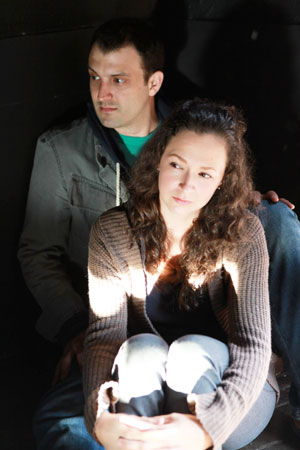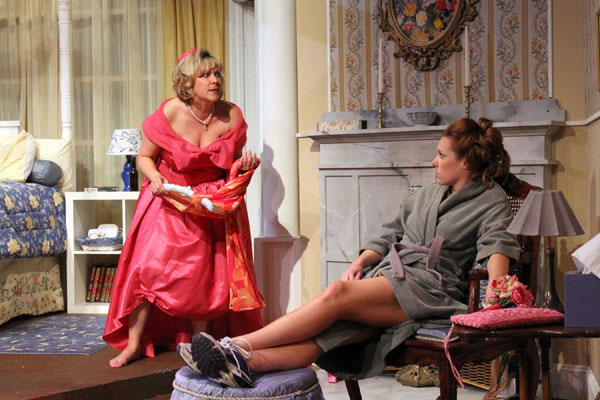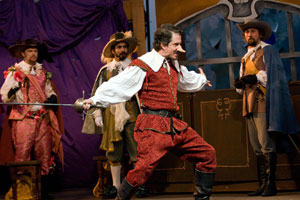Relationships are screwed up in ‘Dying City,’ ‘5 Women,’ ‘Cyrano’
ARNOLD WAYNE JONES | Life+Style Editor
jones@dallasvoice.com
All of the female characters in Alan Ball’s comedy Five Women Wearing the Same Dress fit cozily into “types:” Cynical young rebel Meredith (Catherine DuBord); perky, Bible-quoting Frances (Heather Sims); saucy beauty queen Trisha (Emily Scott Banks); emotionally volatile Georgeanne (Barrett Nash); blowsy lesbian Mindy (Catherine Wall). You can practically hear a pitch meeting where he tried to get a network to option it as a sitcom.
But there’s nothing wrong with situational comedy, especially when it’s presented with such frothy fun. The danger is when the jokes and set-ups never move beyond what’s expected. Familiarity truly can breed contempt.
 That doesn’t happen here, though it could. When Meredith enters — cig drooping from her lips, her sunglasses and leather biker jacket barely hiding a bridesmaid dress that looks like a hideous explosion of Pepto-Bismol, taffeta and bows — it seems like a shorthand to establish her character as “the bad girl.” But DuBord goes further, as Ball’s script allows her, finding depth between all the one-liners.
That doesn’t happen here, though it could. When Meredith enters — cig drooping from her lips, her sunglasses and leather biker jacket barely hiding a bridesmaid dress that looks like a hideous explosion of Pepto-Bismol, taffeta and bows — it seems like a shorthand to establish her character as “the bad girl.” But DuBord goes further, as Ball’s script allows her, finding depth between all the one-liners.
She and the other four ladies are all attendants at her sister’s wedding, though none of them seem to like the bride very much. They reconnect with each other, bonding over their hatred for the sickening frosting-colored gowns, the sleazy guests … and sometimes each others’ prejudices. (Frances is appalled that the groom has a lesbian sister “and everyone knows it!? They look just like real women!”)
The cast is superb, with the standouts a sassy, beautiful Banks (whose authoritative entrance pegs her instantly as the character to watch) and Wall (who delivers the punchy lines with brio). Ball is clearly out-magnoling Steel Magnolias, with dishy dialogue as well as zingers about the Christian right and thoughtful observations about AIDS and child abuse, but he never lets those aspects weigh down its confectionary tone. If there’s only one June wedding you attend this year, make it this one.
Dying City isn’t the most upbeat title for a play that itself is sometimes swallowed by sadness, but Second Thought’s regional premiere of this play about a gay man (Rhett Henckel) who visits the widow (Grace Heid) of his twin brother (also Henckel) a year after his apparent suicide in Iraq has much to recommend it, notably its two actors.
As the gay brother, Henckel is marvelously superficial playing an actor who’s a bit too full of himself and whose attempts to connect with his sister-in-law fall infuriatingly short. Heid is less accessible emotionally (she spends too much time with her arms crossed across her slender frame), but she modulates the scene between past and present beautifully.
The play itself is a reverie on Truth and Perception and War and Human Understanding — big themes that are difficult to resolve, or even give sufficient cursory treatment, but if writer Christopher Shinn bites off more than he can chew, he gets props for trying to do something meaningful and contemporary without banging his (or our) head into a wall.
For 40 years, Dallas’ Shakespeare in the Park has been just that: The Bard, and just the Bard, outdoors.
But Bill only wrote 38 plays (and far fewer good ones), so to mix it up this season, Shakespeare Dallas has thrown in Edmond Rostand’s Cyrano de Bergerac. It is a somewhat puzzling addition. Rostand wrote it about 300 years after Shakespeare; although written in verse (in French), the translation of this production removes most of the poetry.
And then there’s this little problem: It’s not actually that good of a play. Cyrano’s poetry is purple; the death scene is needlessly prolonged; the characters largely unlikable.
This production clocks in at more than three hours — a long time to sit in the punishing winds and Texas heat of Samuell-Grand Amphitheater. Its famous central conceit — that the big-nosed poet and warrior Cyrano (Chris Hury) writes all the love notes to his beloved Roxane (Lydia Mackay) on behalf of the doltish young hottie Christian (Austin Tindle) — isn’t even introduced into more than an hour in. Until then we spend a lot of time with peripheral characters; after then, we begin to realize what a high-maintenance and superficial bitch Roxane really is. (When Christian doesn’t woo her with good poems, she turns on him like a snake.)
I cannot imagine that the director, Raphael Perry, has ever instructed any actor to “tone it down:” There’s a stentorian, commedia dell’arte flamboyance to the performances he leads, and it’s rarely needed, even in the gustiness of outdoors that often carried the miked voices of the actor into the trees. (At times, the winds blew so hard on the extensively caped cast I thought it might morph into a stage version of Batman; I started looking to see if Julie Taymor was around.) Even the costumes are freakishly overdone, some shoes bedecked with such garish pompoms that it appears the actors are continually kicking Teletubbies.
Nonetheless, the balcony scene (perhaps that’s the Shakespeare connection) is superbly wrought by the central actors, and despite its length (and the overall “eh” reaction I had when it was over) there is a calming, civilized wave that befalls as you sit amid nature, eating cheese and pinot grigio out of a picnic basket while a play rages on before you. It ain’t the Winspear. But neither is it a walk in the park.
Five Women Wearing the Same Dress. Through July 2. ContemporaryTheatreofDallas.com. Dying City. Through July 2. SecondThought Theatre.com. Cyrano de Bergerac (in repertory with As You Like It). Through July 23. Shakespeare Dallas.org.
This article appeared in the Dallas Voice print edition June 24, 2011.















